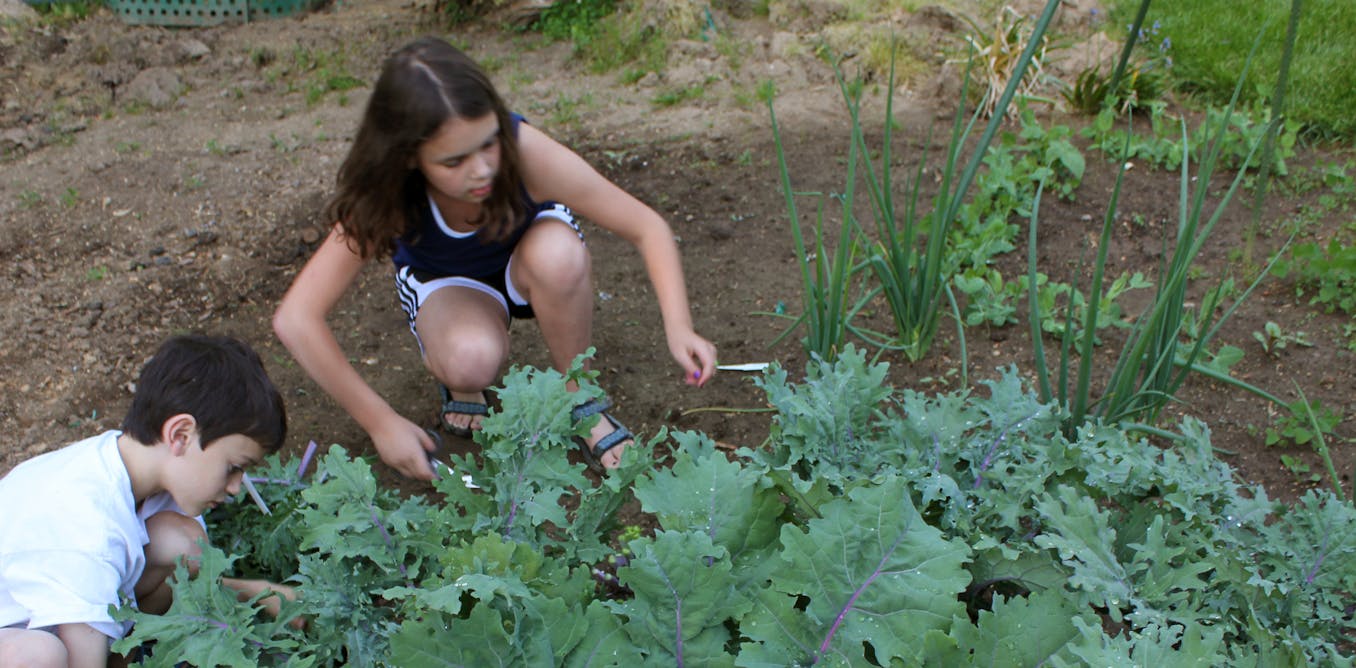[ad_1]
It’s back-to-school time within the US, and for quite a few youngsters all through the nation, it’s moreover time to get once more into the varsity yard.
For a whole bunch of years, educators and philosophers have argued that garden-based learning improves youngsters’s intelligence and boosts their personal nicely being. Currently, points related to childhood weight issues and youthful people’s disconnection from nature have led to a revitalized curiosity inside the matter.
Tens of 1000’s of American faculties have some kind of faculty yard. Many are located on faculty grounds and others are run by exterior neighborhood companions. Most are associated to the faculty’s curriculum. As an illustration, seeds are utilized in science class to make clear plant biology, fruits are utilized in social analysis to indicate world geography and the harvest is utilized in math to find weights and measures. Some even incorporate meals from the yard into the varsity lunch.
As a researcher and an activist, I’ve spent the upper part of the ultimate decade working to promote a healthful, equitable and sustainable meals system. Through this course of, I’ve heard daring claims made regarding the vitality of garden-based learning to meet these challenges.
Given the keenness that surrounds garden-based learning within the current day, it’s worth taking stock of their basic impacts: Do faculty gardens actually improve the education and nicely being of youthful people?
Promoting faculty gardens
School gardens have turn into a favorite strategy of distinguished advocates inside the “Good Meals Movement.” Every celeb chef Jamie Oliver and First Lady Michelle Obama have been vocal supporters.
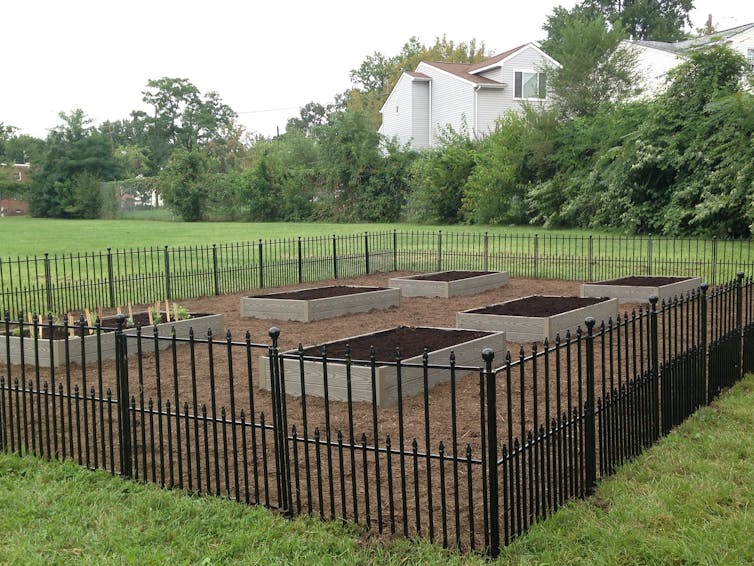
U.S. Division of Agriculture
Nonprofit and grassroots groups, who see these gardens as a way to provide current produce for the meals insecure, have forged partnerships with native faculties. Then there are service-based groups, just like FoodCorps, whose members spend one 12 months in a low-income neighborhood to help arrange gardens and develop totally different faculty meals initiatives.
Philanthropic organizations identical to the American Coronary coronary heart Affiliation have moreover sponsored the event of an entire bunch of current faculty yard plots.
Taken collectively, upwards of 25 p.c of public elementary faculties within the US embody some kind of garden-based learning. School yard duties are located in every space of the nation and serve faculty college students of all ages, ethnic backgrounds and socioeconomic classes.
Transforming kids lives by gardens?
Advocates argue that gardening helps kids make extra wholesome consuming selections. As a result of the self-proclaimed “Gangsta Gardener” Ron Finley put it in his widespread TED Communicate,
“If kids develop kale, kids eat kale.”
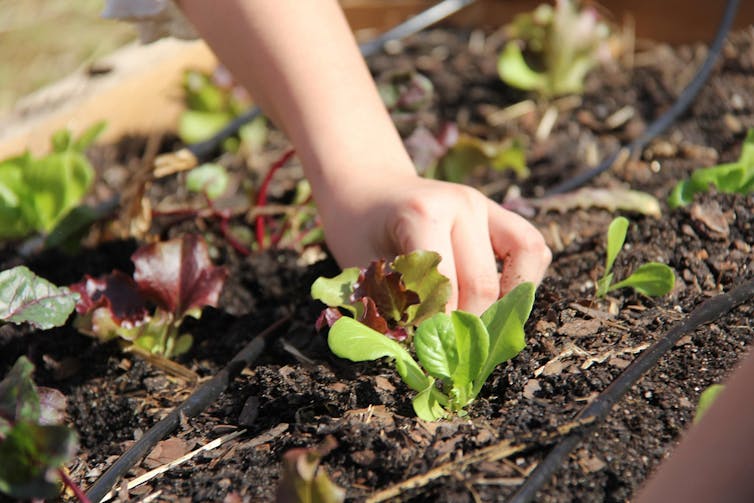
UGA School of Ag & Environmental Sciences – OCCS, CC BY-NC
Many proponents go even further, suggesting that garden-based learning can encourage a variety of healthful changes for the complete family, serving to to reverse the so-called weight issues epidemic.
Others, like Edible Schoolyard founder Alice Waters, argue which have inside the yard can have a transformative have an effect on on a child’s worldview, making sustainability “the lens by which they see the world.”
Sure, gardens can help
There could also be a great deal of anecdotal proof to suggest that garden-based learning does yield educational, dietary, ecological and social benefits.
As an illustration, numerous printed analysis have confirmed that garden-based learning can enhance faculty college students’ science knowledge and healthful meals behaviors. Totally different evaluation has confirmed that garden-based learning can help faculty college students increased decide a number of sorts of greens along with end in additional favorable opinions on consuming greens.
Normally, qualitative case analysis of garden-based learning have been encouraging, providing narratives of life-changing experiences for kids and teachers alike.
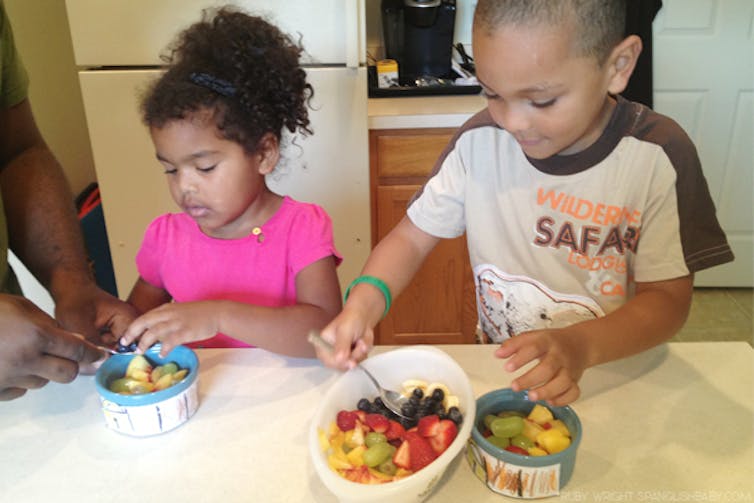
RubyDW, CC BY
Nonetheless, in relation to actually rising the amount of current meals eaten by youthful people, bettering their nicely being outcomes or shaping their basic environmental attitudes, quantitative outcomes have tended to point modest constructive components at biggest. A number of of essentially the most extraordinarily developed faculty yard packages have been able to enhance pupil vegetable consumption by a few serving per day. Nonetheless the evaluation has not been able to current whether or not or not these constructive components are maintained over time.
A shortage of definitive proof has led some critics to argue that school gardens are merely not positively well worth the time and funding, notably for lower-income faculty college students who is likely to be concentrating on additional standard college prep analysis.
The social critic Caitlin Flanagan has gone so far as to say that yard packages are a distraction which may create a “eternal, uneducated underclass.”
There will not be any magic carrots
There is not a doubt that the flexibility of garden-based learning is usually overstated.
Notably when describing yard duties in low-income neighborhoods and communities of coloration, widespread narratives counsel {{that a}} teen’s time inside the yard will rescue her from a lifetime of poverty and continuous sickness.
I identify this the “magic carrot” technique to garden-based learning. Nonetheless as everybody is aware of, there will not be any magic carrots rising inside the faculty yard.
Gardens alone is just not going to take away nicely being disparities, shut the tutorial achievement gap, restore unemployment or treatment environmental injustice.
When is a yard worthwhile?
For gardens to efficiently promote learning and nicely being, they must be supported and bolstered by the neighborhood as an entire. Surveys of college yard practitioners current that yard packages have crucial potential to spice up faculty and neighborhood life – nevertheless supplied that certain conditions are met.
Notably, faculty gardens are most worthwhile after they aren’t held afloat by a single devoted coach. Instead, numerous involved stakeholders could be sure {that a} yard doesn’t dry up after solely a season or two.
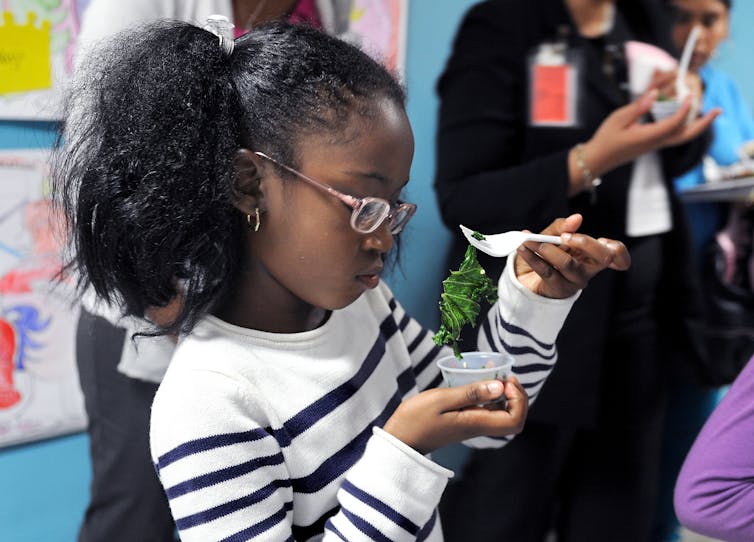
U.S. Division of Agriculture, CC BY
As an illustration, participation from administrators, households and neighborhood companions can flip a school yard proper right into a dynamic and sustainable neighborhood hub.
Many expert practitioners have moreover confirmed that garden-based learning is additional extremely efficient when its curriculum shows the cultural backgrounds of the youthful people it serves. When youngsters of Mexican descent develop indigenous sorts of corn, or when African-American youth cultivate collard greens, the strategy of rising meals can turn into a method of self-discovery and cultural celebration.
In several phrases, if kids develop kale, they might eat kale, nevertheless supplied that kale is obtainable of their neighborhood, if their family can afford to buy kale and within the occasion that they assume consuming kale is expounded to their custom and lifestyle.
Creating priceless inexperienced home
As my very personal evaluation has highlighted, there are organizations and faculties all through the nation that incorporate garden-based learning into broader actions for social, environmental and meals justice.
These groups acknowledge that school gardens alone is just not going to magically restore the problems our nation faces. Nonetheless as part of a long-term movement to boost neighborhood nicely being, faculty gardens can current a platform for experiential education, create priceless inexperienced home and foster a approach of empowerment inside the minds and our our bodies of youthful Folks.
[ad_2]
